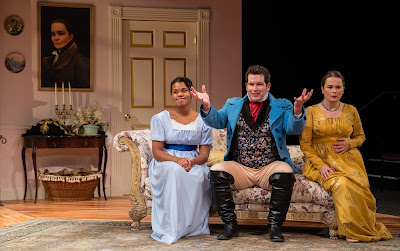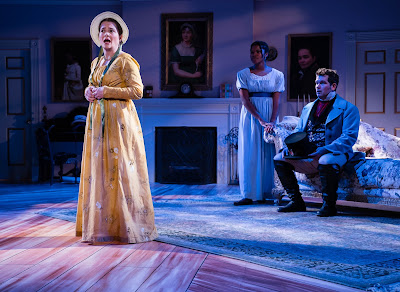By James V. Ruocco
"Pride and Prejudice."
"Sense and Sensibility."
"Mansfield Park."
"Emma."
"Persuasion."
"Northanger Abbey."
Six novels, two published posthumously in 1818 following her death the year before, English novelist Jane Austen's works are best known for their honesty, social commentary and realistic, often ironic accounts of 19th century women seeking economic security, favorable social standing and serious romantic commitment through the institution of marriage.
Rich in language, comedy, wit and romance, these works transformed Austen into a literary lioness whose observations, class structures and societal genius resonated comfortably and intuitively with readers from generation to generation.
That excitement, no doubt, led to the creation of "The Complete Works of Jane Austen (Abridged)," a playful, lively and sometimes exhausting work that pokes fun at her popular novels, her famous characters, her preserved traditions and arguments, her glib, important language and more importantly, her treasured, romantic endings.
At Playhouse on Park, now in its 15th season, three marvelously creative actors take center stage to engage the audience in all things Austen for an abridged 90-minute plus reenactment of novelizations that kick off with promise, merrily orchestrated cajoles and giggles, high tea preening and posturing and 19th century madness that affectionately pays tribute to the lady herself.
Unfortunately, the play periodically runs out of steam, backs itself into a corner, falls flat, disconnects or causes one's mind to wander. Then, before you can say Elizabeth Bennett, Fitzwilliam Darcy, Emma Woodhouse and Frederick Wentworth, "The Complete Works of Jane Austen (Abridged)" quickly picks itself up with plenty of English Regency gallop and commitment as it races toward the finish line.
Getting there, however, isn't always easy, a fault of the quartet of writers involved, namely Jessica Bedford, Kathryn MacMillan, Charlotte Northeast and Meghan Winch. While their intentions are good, as are their knowledge of Austen's literary canon, they automatically assume that the theatergoer is familiar with every single character and story arc from "Pride and Prejudice" to "Northanger Abbey."
Their choices - narration, asides, insight, explanations, the breaking of the fourth wall - are sincere and enthusiastic enough - but depending on the segment, novel of choice, or intentional bastardization, the end result isn't always satisfying, hilarious or gosh-oh-gee, let's hit replay and watch it again.
Staging "The Complete Works of Jane Austen (Abridged)," Kathryn MacMillian (she is also one of the play's writers) jump starts the production with grab-bag, watchable comfort and imagination. With the aid of select props, costumes, hats, melodramatic twists and turns, gasps, sighs, shouts and exaggeration, the mood is set, the verbiage is inked, and the English Regency period blossoms with apt animation and flourish.
Still, MacMillian can't work miracles.
The farce, at hand, tends to wear thin. Explanations of plotlines - "Northanger Abbey," for example - are tedious. Occasional modernizations - "Dungeons & Dragons" - flatline. Pacing, at times, is also a problem.
The cast - Charlotte Northeast, Brittany Onukwugha, Shannon Michael Wamser - are brilliant, from start to finish, even when the script is not up to their standards. All three have great fun moving from novel to novel, character to character and challenge to challenge. They are engaging. They are animated. They are delightful. They are emotional. They are irreverent. They are fanatical. They are willing and ready.
They also have great fun changing costumes, shifting moods, making faces, breaking the fourth wall to address the audience and reenacting bits and pieces from Austen's celebrated novels and lesser-known works.
That said, "The Complete Works of Jane Austen (Abridged)" is fun and funny but sadly, often interrupted by scenes and dialogue that suggest immediate BBC mini-series intervention or a trip to Hatchards for a hardback copy of "Pride and Prejudice," "Sense and Sensibility" or "Persuasion" for a true sense of the real English Regency period and its literary inhabitants as seen through the lens of the lady herself.




No comments:
Post a Comment